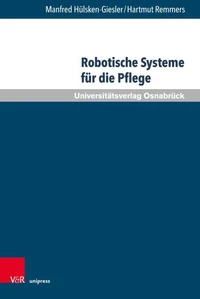Neue Technologien für die Pflege. Grundlegende Reflexionen und pragmatische Befunde
Par : , , , ,Formats :
Disponible dans votre compte client Decitre ou Furet du Nord dès validation de votre commande. Le format PDF est :
- Compatible avec une lecture sur My Vivlio (smartphone, tablette, ordinateur)
- Compatible avec une lecture sur liseuses Vivlio
- Pour les liseuses autres que Vivlio, vous devez utiliser le logiciel Adobe Digital Edition. Non compatible avec la lecture sur les liseuses Kindle, Remarkable et Sony
 , qui est-ce ?
, qui est-ce ?Notre partenaire de plateforme de lecture numérique où vous retrouverez l'ensemble de vos ebooks gratuitement
Pour en savoir plus sur nos ebooks, consultez notre aide en ligne ici
- Nombre de pages408
- FormatPDF
- ISBN978-3-8470-1202-3
- EAN9783847012023
- Date de parution06/12/2021
- Protection num.pas de protection
- Taille5 Mo
- Infos supplémentairespdf
- ÉditeurV&R Unipress
Résumé
Die Digitalisierung der Pflege ist umstritten. Ist es legitim, ein Handlungsfeld zu technologisieren, das Sorgearbeit mit vulnerablen Menschen in den Mittelpunkt stellt? Die Debatte um die Entwicklung, Erprobung und Bewertung von neuen, digitalen Technologien für die Pflege boomt in Deutschland. Nach einer dynamischen Forschungs- und Entwicklungsphase zu digital gestützten Informationssystemen und Assistiven Technologien für die Pflege steht nun eine Auseinandersetzung um die Bedeutung von Autonomen und gegebenenfalls auch Lernenden Systemen für die Pflege und Pflegebildung bevor.
Dieser Band versammelt grundlegende und pragmatische Reflexionen zum Thema, um Impulse und Orientierungen für eine systematische Diskussion um Chancen und Herausforderungen des Technikeinsatzes auf der praktischen Versorgungsebene der direkten Pflege, der Ebene der institutionellen Organisation von Versorgungsprozessen sowie einer übergeordneten gesellschaftlichen Ebene zu liefern. The discourse about the development, testing and evaluation of new, digital technologies for nursing is dynamic.
Digitally supported information systems and assistive technologies to support nursing have become increasingly established in recent years. Currently, the importance of Robotics and Autonomous Systems as well as Learning Systems for nursing and nursing education is increasingly discussed. The volume presents fundamental and pragmatic reflections on the digitalisation of nursing in order to provide impulses and orientation for a systematic discussion about opportunities and challenges of the use of technology in nursing.
The contributions deal with the possibilities and limitations of digitalisation for the practice of nursing, the institutional organisation of care and for the social understanding of care.
Dieser Band versammelt grundlegende und pragmatische Reflexionen zum Thema, um Impulse und Orientierungen für eine systematische Diskussion um Chancen und Herausforderungen des Technikeinsatzes auf der praktischen Versorgungsebene der direkten Pflege, der Ebene der institutionellen Organisation von Versorgungsprozessen sowie einer übergeordneten gesellschaftlichen Ebene zu liefern. The discourse about the development, testing and evaluation of new, digital technologies for nursing is dynamic.
Digitally supported information systems and assistive technologies to support nursing have become increasingly established in recent years. Currently, the importance of Robotics and Autonomous Systems as well as Learning Systems for nursing and nursing education is increasingly discussed. The volume presents fundamental and pragmatic reflections on the digitalisation of nursing in order to provide impulses and orientation for a systematic discussion about opportunities and challenges of the use of technology in nursing.
The contributions deal with the possibilities and limitations of digitalisation for the practice of nursing, the institutional organisation of care and for the social understanding of care.
Die Digitalisierung der Pflege ist umstritten. Ist es legitim, ein Handlungsfeld zu technologisieren, das Sorgearbeit mit vulnerablen Menschen in den Mittelpunkt stellt? Die Debatte um die Entwicklung, Erprobung und Bewertung von neuen, digitalen Technologien für die Pflege boomt in Deutschland. Nach einer dynamischen Forschungs- und Entwicklungsphase zu digital gestützten Informationssystemen und Assistiven Technologien für die Pflege steht nun eine Auseinandersetzung um die Bedeutung von Autonomen und gegebenenfalls auch Lernenden Systemen für die Pflege und Pflegebildung bevor.
Dieser Band versammelt grundlegende und pragmatische Reflexionen zum Thema, um Impulse und Orientierungen für eine systematische Diskussion um Chancen und Herausforderungen des Technikeinsatzes auf der praktischen Versorgungsebene der direkten Pflege, der Ebene der institutionellen Organisation von Versorgungsprozessen sowie einer übergeordneten gesellschaftlichen Ebene zu liefern. The discourse about the development, testing and evaluation of new, digital technologies for nursing is dynamic.
Digitally supported information systems and assistive technologies to support nursing have become increasingly established in recent years. Currently, the importance of Robotics and Autonomous Systems as well as Learning Systems for nursing and nursing education is increasingly discussed. The volume presents fundamental and pragmatic reflections on the digitalisation of nursing in order to provide impulses and orientation for a systematic discussion about opportunities and challenges of the use of technology in nursing.
The contributions deal with the possibilities and limitations of digitalisation for the practice of nursing, the institutional organisation of care and for the social understanding of care.
Dieser Band versammelt grundlegende und pragmatische Reflexionen zum Thema, um Impulse und Orientierungen für eine systematische Diskussion um Chancen und Herausforderungen des Technikeinsatzes auf der praktischen Versorgungsebene der direkten Pflege, der Ebene der institutionellen Organisation von Versorgungsprozessen sowie einer übergeordneten gesellschaftlichen Ebene zu liefern. The discourse about the development, testing and evaluation of new, digital technologies for nursing is dynamic.
Digitally supported information systems and assistive technologies to support nursing have become increasingly established in recent years. Currently, the importance of Robotics and Autonomous Systems as well as Learning Systems for nursing and nursing education is increasingly discussed. The volume presents fundamental and pragmatic reflections on the digitalisation of nursing in order to provide impulses and orientation for a systematic discussion about opportunities and challenges of the use of technology in nursing.
The contributions deal with the possibilities and limitations of digitalisation for the practice of nursing, the institutional organisation of care and for the social understanding of care.





